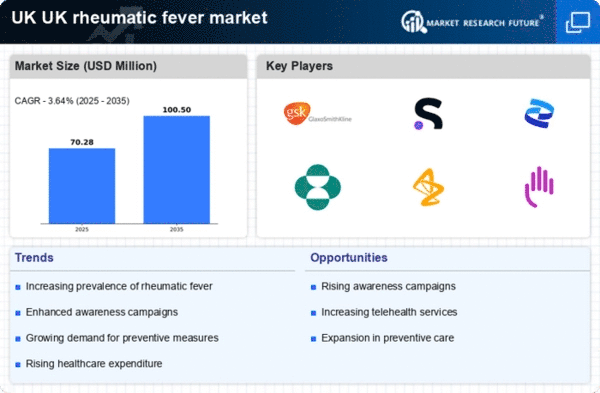Rising Awareness and Education
Rising awareness and education regarding rheumatic fever are pivotal drivers for the rheumatic fever market. Public health campaigns and educational programs aimed at both healthcare professionals and the general public are crucial in promoting understanding of the disease. Increased awareness leads to earlier diagnosis and treatment, which can significantly reduce the incidence of rheumatic fever. Schools and community organizations are increasingly involved in disseminating information about the importance of recognizing symptoms and seeking timely medical attention. This heightened awareness is likely to result in a greater demand for healthcare services and interventions, thereby expanding the rheumatic fever market. As educational initiatives continue to evolve, they may also encourage preventive measures, further contributing to market growth.
Government Initiatives and Funding
Government initiatives aimed at combating rheumatic fever are significantly influencing the rheumatic fever market. The UK government has implemented various public health campaigns to raise awareness about the disease and its prevention. Funding allocated for research and development in this area has increased, with the aim of improving treatment protocols and preventive strategies. For instance, the NHS has introduced programs focusing on early detection and management of streptococcal infections, which are known to trigger rheumatic fever. This proactive approach not only enhances patient outcomes but also stimulates market growth by encouraging pharmaceutical companies to invest in new therapies. The financial support from governmental bodies is likely to foster innovation and expand the availability of effective treatments, thereby positively impacting the rheumatic fever market.
Rising Incidence of Rheumatic Fever
The increasing incidence of rheumatic fever in the UK is a critical driver for the rheumatic fever market. Recent data indicates that the prevalence of rheumatic fever has shown a concerning rise, particularly among children aged 5 to 15 years. This trend necessitates enhanced healthcare interventions and resources, thereby expanding the market. The National Health Service (NHS) has reported a notable increase in hospital admissions related to rheumatic fever, which underscores the urgency for effective treatment options. As awareness grows regarding the long-term complications associated with rheumatic fever, including rheumatic heart disease, the demand for innovative therapies and preventive measures is likely to escalate. Consequently, this rising incidence is expected to propel the rheumatic fever market forward, as healthcare providers seek to address the growing burden of this preventable disease.
Advancements in Treatment Modalities
The rheumatic fever market is experiencing a transformation due to advancements in treatment modalities. Recent innovations in pharmacological therapies, including the development of new antibiotics and anti-inflammatory agents, are enhancing the management of rheumatic fever. These advancements are crucial, as they provide healthcare professionals with more effective tools to combat the disease and its complications. Furthermore, the introduction of biologic therapies has shown promise in reducing the inflammatory response associated with rheumatic fever. As these treatment options become more widely available, they are expected to drive market growth. The increasing focus on personalized medicine also suggests that tailored treatment approaches may emerge, further influencing the rheumatic fever market. This evolution in treatment strategies is likely to improve patient outcomes and reduce the long-term burden of the disease.
Collaboration Among Healthcare Stakeholders
Collaboration among healthcare stakeholders is emerging as a vital driver for the rheumatic fever market. Partnerships between government agencies, healthcare providers, and non-profit organizations are fostering a comprehensive approach to managing rheumatic fever. These collaborations facilitate the sharing of resources, knowledge, and best practices, which can enhance the effectiveness of prevention and treatment strategies. For instance, joint initiatives aimed at improving access to healthcare services in underserved communities are crucial in addressing the disparities in rheumatic fever incidence. Such collaborative efforts are likely to lead to the development of integrated care models that prioritize early intervention and continuous management of the disease. As these partnerships strengthen, they are expected to positively influence the rheumatic fever market by creating a more coordinated response to this public health challenge.
















